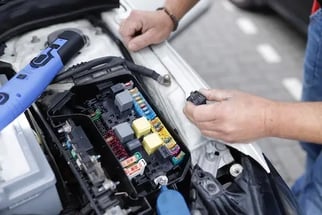Fleet vehicle tracking is more popular than ever. Businesses, both big and small, rely on them to keep track of their vehicles and precious cargo. It's a market segment that's worth over $17 billion.
These trackers can do plenty of amazing things. They'll streamline your operations, help you plan routes, and even keep you aware of necessary maintenance.
Plenty of industries can benefit from using a vehicle tracker, even those that only make local stops. You don't need to be traveling great distances to reap their rewards.
Read on to learn all about vehicle trackers and which one is right for your business.
How Fleet Tracking Works
All fleet GPS tracking systems feature a GPS device that interfaces with specific monitoring software.
Once the tracker is installed in the vehicle, it communicates with a cluster of satellites. These can provide you with information like the speed the vehicle is traveling at, the location of the vehicle, and the direction the vehicle is heading.
Different kinds of trackers transit this data at different intervals. You can often customize its transmission rate.
Benefits of GPS Tracking
GPS trackers are a must for anyone that manages a fleet of vehicles. They offer a number of advantages that can help your business run smoothly, save you money, and increase your operational efficiency.
Improve Safety
GPS trackers can help you monitor your fleet of drivers and take steps that improve the safety of everyone on the road.
These trackers can monitor a vehicle's speed and relay that information to you. You and your drivers will be able to see patterns of aggressive driving, like speeding, tailgating, and sudden braking, and work to rectify those behaviors.
Just installing a tracker is enough to make many drivers reconsider the way they operate a company vehicle.
Safer driving practices will dramatically lower the risk of one of your drivers getting into an accident. It's also great for improving the lifespan of your vehicles. They'll last much longer when driven in a safer manner.
If a driver does get into an accident or experiences a breakdown, the tracker can help you locate them in an instant. You'll be able to provide their location to the necessary services and get them the help they need.
You'll also have a record of what led to the incident, which can be beneficial when dealing with insurance companies.
Optimize Driver Routes
Route planning is one of a fleet manager's most important responsibilities. GPS trackers give you the power to take total control of it, allowing your company to be more efficient than ever before.
You'll have real-time knowledge of your drivers' exact locations at your fingertips. You'll know if a delivery took longer than expected or if something like a road closure forced a driver to take a different route. With this information, you can pivot your fleet management strategy on the fly.
This will keep your customers satisfied and guarantees you'll be as productive as possible.
GPS trackers also prevent drivers from getting lost. They'll record the drive in their trip history, so future drivers can take the same efficient route.
Find Lost or Stolen Vehicles Fast
Your business invests a considerable amount of money into buying and maintaining fleet vehicles, and being without one can seriously hamper your productivity.
The good news is that outfitting a vehicle with a GPS tracker makes recovering stolen property simple. You'll be able to provide law enforcement with accurate information on the vehicle's location, and it should be back in your possession shortly.
Marking your vehicle with a sticker that indicates it's tracked by GPS could also be enough to dissuade potential thieves.
Spend Less on Fuel
Fuel represents a sizable portion of a fleet's budget, and gas is more expensive than ever. With a GPS tracker installed on all of your fleet vehicles, you'll be able to substantially lower the amount of money spent on fuel.
You'll be able to plan the most efficient routes, so no mile driven is wasted. Drivers also won't waste precious gas getting lost on their way to a customer. Trackers can also curb aggressive driving habits, which consume more fuel.
A less obvious benefit of GPS trackers is that they'll be able to account for fuel wasted while idling. Some drivers may let their fleet truck idle while at a job, believing it can save gas. However, it's much more efficient to turn a vehicle off rather than let it idle.
A tracker can help you identify and put an end to this behavior.
Alerts for Maintenance
GPS trackers provide a wealth of information. You have access to the exact mileage driven, the operators' driving habits, and the kind of terrain a vehicle encountered. This allows you to develop an in-depth service plan for all of your fleet vehicles.
Poor maintenance is the cause of many vehicle breakdowns, but an in-depth service plan helps you keep your fleet on the road. You'll never be caught off-guard by routine maintenance.
You can schedule mileage-specific things like oil changes and tire rotations in advance, so you can develop a plan for how your company will pick up the slack while that vehicle receives service.
Trackers that plug into a vehicle's onboard diagnostics (OBD) port can provide even more in-depth information. You'll know if any of a vehicle's warning lights are turned on so you can pull that one aside for repairs.
Businesses That Use GPS Tracking
GPS trackers are incredibly versatile. Here are just a few types of businesses that make use of them.
Utility Workers
Utility workers like HVAC professionals and electricians need to drive a work truck to their customers. Their companies often make use of GPS trackers to ensure that the worker stays on task and arrives at the customer's location in an expedient manner.
Dispatchers also use the information provided by the trackers to give customers updates on when to expect the technician to arrive.
Construction
Construction companies often have a fleet of different kinds of vehicles. These vehicles all cost a significant amount of money and need to be protected at all costs.
Many construction outfits also service multiple job sites. You'll have real-time information on the location of all your machinery and can develop a plan for the most efficient allocation of your resources.
Trucking
Trucking companies were one of the first industries to embrace GPS fleet tracking. In this line of work, safety and efficiency are imperative for success.
The trucking industry continues to make extensive use of these trackers to plan the ideal routes and to monitor the speed and safety of their drivers.
Delivery Services
The internet makes home delivery easy, and a customer can have almost anything delivered right to their door. No matter what a customer orders, delivery drivers need to be able to find the most efficient route to a specific address in order to save time and money.
Kinds of GPS Tracking Solutions
No matter which industry you're a part of, there's a GPS tracker that can serve your needs. Many tracking products can be combined to provide a blanket of coverage.
Vehicle Trackers
Vehicle trackers are ideal for tracking a single vehicle in a larger fleet.
There are two kinds of fleet vehicle trackers. One kind plugs into the vehicle's OBD port. Most cars made after 1996 have this kind of port. They're very easy to install.
The other kind needs to be hardwired into the vehicle's wiring harness. If your fleet vehicles don't have an OBD port, you'll need to opt for this kind of tracker. You'll probably need the help of a mechanic to install these.
No matter which kind of tracker you use, you'll be able to see the vehicle's real-time location, its speed, and its direction of travel. They update their location every minute while the vehicle is running and once every hour while it's turned off.
Asset Trackers
Asset trackers are ideal for larger machinery. They're made of durable products so they're suitable for more rugged conditions.
Asset trackers can either be wired into the vehicle or make use of a battery with an exceptionally long life.
Dash Cams
All GPS trackers can connect with a fleet tracking dash cam. They're an invaluable tool that can help you get the most out of your GPS tracking.
They record both the interior and exterior of the vehicle and upload the footage to a cloud-based storage system. You'll be able to view the feed in real-time or review it at your convenience.
You'll have insight into various traffic conditions and can monitor your drivers' behavior.
Dash cam footage can also protect your company in the event of an accident. You can submit it to the police and to insurance companies should something occur on the road.
Choosing a GPS Tracker
These trackers have many uses and benefits. To determine which solution is best for your business, you'll have to consider a few key things.
Age of Your Fleet
Fleets of newer vehicles are equipped to interface with a tracker that plugs right into the OBD port. Some businesses with more modern fleets prefer these because it allows them to save money on installation costs.
If your fleet is composed of older vehicles, they might not be an option.
Tamper Resistance
OBD port trackers are easy to install, but certain drivers may attempt to tamper with them. These trackers can be unplugged just as easily as they're installed.
If you're looking for a tamper-resistant tracker, you'll need to invest in the hardwired tracker. Disgruntled drivers won't be able to remove them.
Heavy Machinery
Tracking heavy machinery like construction equipment comes with a unique set of challenges. These kinds of vehicles are exposed to more rugged working conditions than vehicles like delivery trucks.
You'll need a durable tracker that can withstand a demanding environment. For this, asset trackers are an excellent choice.
They're composed of high-quality materials and have a long battery life so you can continue to track a vehicle even if you have to leave it at a job site.
Trailer Tracking
An asset tracker is also a great trailer tracking device. If you're a trucking company or a rental company, you need to be able to keep tabs on your equipment at all times.
An asset tracker's long battery life, rugged construction, and waterproofing mean you never have to worry about being in the dark when it comes to the location of your cargo.
They also have unauthorized movement warnings. You'll immediately receive a notification if your trailer moves without your permission.
Do You Need a Dash Cam?
Dash cams are the perfect complement to all kinds of tracking devices. Consider augmenting every vehicle tracker with dash cam footage.
They are unobtrusive, so they won't interfere with your drivers' responsibilities. The footage they provide proves invaluable in the event of an accident.
They can also help you keep tabs on your drivers' habits. You'll know who conducts themselves properly behind the wheel.
Stay Informed with a Vehicle Tracker
Every fleet can benefit from a vehicle tracker. It provides a manager or fleet dispatcher with real-time information that can help streamline routes, save money on expenses like gas, and keep your drivers safe.
Choose a tracker based on the age of your vehicle and the level of durability you need the tracker to have. Dash cams are another option that can augment all kinds of tracking devices.
Ready to outfit your fleet with a top-of-the-line tracking solution? Linxup is ready to help you get started. Your fleet will be more efficient than ever thanks to our trackers and user-friendly monitoring software. Reach out to see how we can help you.
Want to know more about the solutions discussed in this article? Click to learn more about Linxup, Linxup Dash Cams, and Fleet Tracking solutions. Or reach out to us, click here on your phone or dial: 1-877-907-0801.


